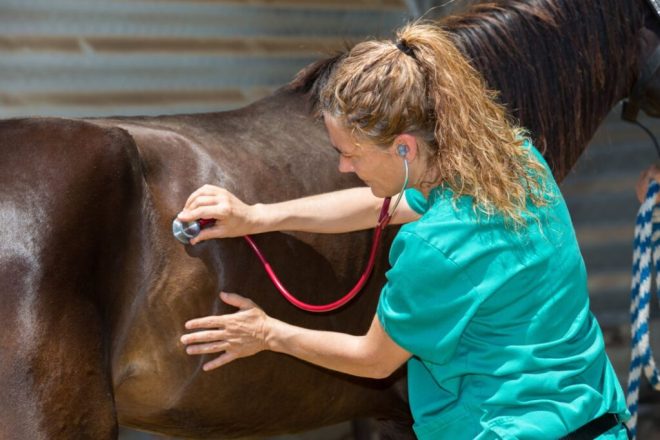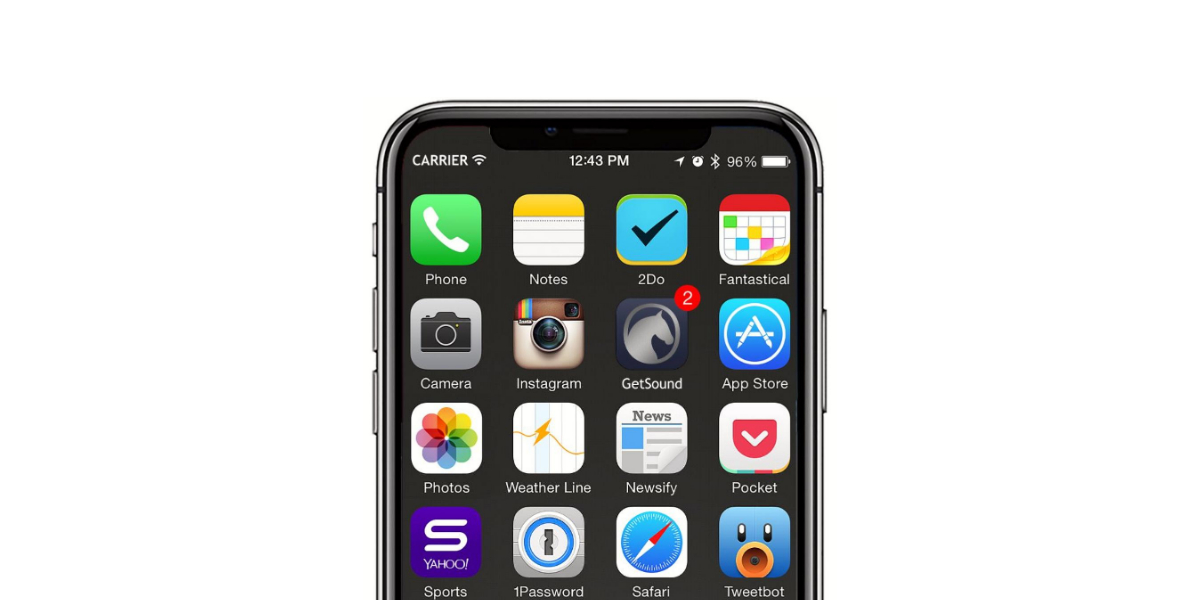Is it legal? YES.
Can it be illegal? Yes.

First, what is veterinary telemedicine exactly? Here’s a short primer:
Telemedicine is specific patient care delivered remotely via some form of technology. This can only legally occur if a Veterinarian-Client-Patient-Relationship (VCPR) already exists from an in-person examination of the animal, generally within the last year. Telemedicine is most often practiced through your cellphone, which is a powerful telemedicine tool when used appropriately (more on that later), to talk, text, send photos and videos, and video chat using an app like FaceTime, WhatsApp, or Zoom.
Telemedicine is not to be confused with Teleadvice, which can occur without a valid VCPR and is limited to the provision of generalized guidance not specific to your particular horse or their particular illness or injury. For example, when a vet recommends you conduct semi-annual fecal exams as a prudent barn health practice, if delivered remotely via technology, that was teleadvice.
Is Telemedicine legal? Yes.
When you have a valid VCPR. The most important aspect of legal telemedicine is having a valid VCPR in place with the particular client and the particular horse. The details of what qualifies as a valid VCPR are regulated by each state’s Veterinary Practice Act, so vets must ensure they operate within the specific rules for each state they are licensed and practicing in. A valid VCPR is also required by the American Veterinary Medicine Association’s (AVMA) Principles of Veterinary Medical Ethics, and every vet must abide by these ethics or risk sanctions like losing their license to practice veterinary medicine.[1]
The AVMA explains that a valid VCPR exists when:
- The veterinarian has assumed the responsibility for making clinical judgments regarding the health of the patient and the client has agreed to follow the veterinarians’ instructions.
- The veterinarian has sufficient knowledge of the patient to initiate at least a general or preliminary diagnosis of the medical condition of the patient. This means that the veterinarian is personally acquainted with the keeping and care of the patient by virtue of a “timely” examination of the patient by the veterinarian, or medically appropriate and “timely” visits by the veterinarian to the operation where the patient is managed.
- The veterinarian is readily available for follow-up evaluation or has arranged for the following: veterinary emergency coverage, and continuing care and treatment.
- The veterinarian provides oversight of treatment, compliance, and outcome.
- Patient records are maintained.[2]
Note: A “timely” examination is generally considered to be at least annual.
The federal VCPR definition specifically requires that veterinarians physically examine animal patients and/or make medically appropriate and timely visits to the location where the animal(s) are kept. The federal VCPR definition cannot be met through telemedicine alone.[3]
When your vet is licensed to practice in the state your horse is standing in. Although it’s not stated in the AVMA’s definition of a valid VCPR, it is understood that the valid practice of veterinary medicine in general can only occur if the vet is licensed to practice in the state your horse is standing in at the time of the medical communication. This does not apply to out-of-state veterinarians consulting for your in-state vet, so long as their practice of veterinary medicine is limited to that consultation.

When telemedicine is prudent. Additionally, the AVMA expects the veterinarian to use prudent judgment when determining if a situation is appropriate for telemedicine or whether an in-person examination is warranted. For example, in a webinar I watched recently, an equine veterinarian told an anecdote about a cut he evaluated via telemedicine. The cut was just above the horse’s hock and appeared superficial in the photos sent by the owner. The vet recommended cleaning and wrapping the wound and having it looked at soon by a veterinarian. The later, in-person exam revealed it was actually a penetrating wound with fragments of the stall door trapped inside the tissue, and there was another wound on the other leg the owner hadn’t mentioned (or perhaps hadn’t noticed). Wound evaluation might not be a prudent use of telemedicine.
When your communications are confidential, and your records are secure. There’s an app for that! Getsound® (cofounded by our own Dr. Bob Grisel) is the only equine telemedicine app on the market, so far. It’s a subscription-based platform that allows you to talk, text, and video chat with your properly VCPR’d veterinarian (it actually helps make sure of that), and it organizes and stores those communications securely on an encrypted, third-party server. Your horse’s medical records are also stored here, so everything is compiled and centralized. For security, it requires both the client and the vet to log into the platform, which means your vet can stop carrying around confidential information in viewable files and emails on their cellphone or iPad.
Can telemedicine be illegal? Yes.
When you don’t have a valid VCPR. You don’t have a valid VCPR if you and your veterinarian haven’t met the requirements of the AVMA, federal, and state-mandated rules for a valid VCPR (referenced above). An example of where this can go wrong is when you wrongly believe you have a valid VCPR in place because your vet checked out a tick bite on your horse’s pastern as they were walking out the door to head to their next call. This passing, last-minute look at just a tick bite is not the “examination” the AVMA had in mind.
When your vet is in the wrong state. It’s not new that practicing veterinary medicine in a place where the practitioner is not licensed is illegal and can result in sanctions in the place where the unlicensed practice occurs and often in the state where the veterinarian is licensed. This is a little less of a problem when your vet is standing on your farm, but telemedicine allows vets from virtually anywhere to reach you and your horse(s), illegally.
In a 2013 federal court case, a Texas-licensed veterinarian gave advice to hundreds of pet owners located around the world for over a decade. The Court enforced his reprimand, fines, and having his veterinary license suspended.[4] He was performing telemedicine with out-of-state and international clients/animals without ever laying a hand on his patients—no jurisdiction + no VCPR = illegal.
PS: You shouldn’t have to dig around to find out where your vet is licensed. The vet must ensure you are aware of their identity, physical location, jurisdiction, license number, and licensure status.[5] If there is any question as to these, just ask.
When your vet’s recordkeeping is lacking, and you’re not helping. You’ve texted. You’ve emailed. You’ve sent videos and video chatted. You’ve even used your phone for its original purpose. There are so many mediums in play, how are all these communications captured? Where and how are they stored?
Vets who are overwhelmed might not store these telecommunications at all, which is illegal. Committed vets often spend countless amounts of time (and therefore money) transcribing your phone calls, text messages, and Zoom conversations into MS Word documents to place in your horse’s patient record, which might even be printed out and put in a real paper file folder, the old-fashioned way. Others will use their office staff to do the transcription, which still technically costs them money. And most vets don’t charge for this admin time spent organizing your shotgun approach to communication. Meanwhile, photos and videos are appended to your horse’s file as best as possible, which might mean an external hard drive that’s not actually connected to your horse’s file at all, other than by name.

Additionally, your telemedicine communications are confidential, and it is the vet’s responsibility to safeguard them. This isn’t new by any means, but it used to mean holding phone conversations in private and printing out records to put in a file folder in an office that’s locked at the end of the day. It’s no longer that simple.
The advent of technology has made it exponentially harder to control recordkeeping because your information is no longer uniformly created and centralized. Now, if your vet loses their phone and your text messages, emails, and videos are on it, they’re in trouble. This kind of exposure might seem trivial to the average horse owner, but it can get your vet in hot water, and if your horse is going for the Olympic team, it might not be so trivial.
When you’re “just asking for advice.” Another major problem is when you think your just asking for teleadvice, but in fact your question is specific to your horse and is actually asking your vet a question that’s answered by the practice of veterinary medicine. That puts your vet at risk if you don’t have a current, valid VCPR in place. Your vet’s instinct is to help you, and they might unintentionally jeopardize their license in the process.
The AVMA defines advice as providing “any health information, opinion, guidance, or recommendation concerning prudent future actions that are not specific to a particular patient’s health, illness, or injury. This is general advice that is not intended to diagnose, prognose, treat, correct, change, alleviate, or prevent animal disease, illness, pain, deformity, defect, injury, or other physical, dental, or mental conditions.”[6] It’s hard to imagine a question so non-specific and so time-sensitive at the same time. Don’t put your vet in a potentially illegal situation, especially since in some states (like Minnesota), provision of advice is the practice of veterinary medicine and therefore requires a valid VCPR.
The COVID Effect
Due to the COVID-19 pandemic, states may have temporarily altered their telemedicine/VCPR provisions. State laws are in flux and telemedicine is rapidly evolving as the need grows in both human and animal medicine. Some states—not all—have applied regulatory discretion to temporarily relax the requirement of an in-person examination to establish a VCPR.[7] On the other side of the spectrum, some states, like North Carolina for example, made clear their decision not to relax requirements via a state notice to practitioners: “The practice of veterinary medicine in the state of North Carolina requires the establishment of a VCPR. This can only take place with a physical examination of the animal in question. It cannot be established over the phone, Skype, or other online source.” If you don’t have a current, valid VCPR, check with your vet (who should check with their state) as to which side of the spectrum you’re on.
Who’s liable?
The VCPR law was written to protect animal patients who can’t advocate for themselves. That’s what we all want right? This is the part of the VCPR designed to keep improperly trained, unlicensed, or predatory vets from making a terrible medical mistake on your horse. In that respect, you should want to gain and maintain a valid VCPR. The other side of this coin is your being a good client. To protect your veterinarian, do your best to keep your VCPR current, streamline telecommunications (consider using a telemedicine app), and don’t ask for more than advice without a VCPR in place.
[1] See AVMA, Principles of veterinary medical ethics of the AVMA, https://www.avma.org/resources-tools/avma-policies/principles-veterinary-medical-ethics-avma.
[2] AVMA, The veterinarian-client-patient relationship (VCPR), https://www.avma.org/resources-tools/pet-owners/petcare/veterinarian-client-patient-relationship-vcpr
[3] American Association of Veterinary State Boards (AAVSB), AAVSB Recommended Guidelines for the Appropriate Use of Telehealth Technologies in the Practice of Veterinary Medicine, September 2018.
[4] Hines v. Alldredge, 783 F.3d 197 (5th Cir. 2015).
[5] American Association of Veterinary State Boards (AAVSB), AAVSB Recommended Guidelines for the Appropriate Use of Telehealth Technologies in the Practice of Veterinary Medicine, September 2018.
[6] AVMA, Veterinary telehealth: The Basics, https://www.avma.org/resources-tools/practice-management/telehealth-telemedicine-veterinary-practice/veterinary-telehealth-basics.
[7] AVMA, Using telemedicine to help care for veterinary patients during COVID-19, https://www.avma.org/resources-tools/animal-health-and-welfare/covid-19/using-telemedicine-help-care-veterinary-patients-covid-19.

